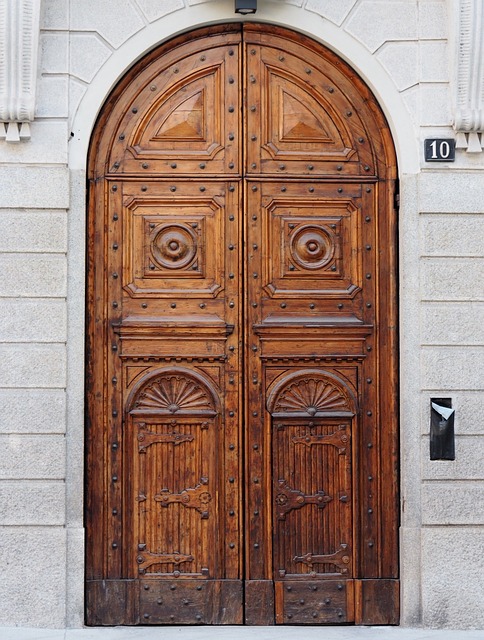The text emphasizes the critical role of ADA-compliant door installation in promoting accessibility and inclusivity across public spaces, both commercial and residential. By adhering to specific ADA door requirements, particularly for handle and lever placement, businesses can create wheelchair-friendly environments that cater to individuals with limited reach or mobility issues. Custom ADA doors, when installed by professional services, offer tailored solutions without compromising aesthetics or functionality, ultimately enhancing accessibility and fostering an inclusive society. These measures not only meet legal obligations but also prioritize the user experience for all visitors.
In ensuring public spaces are inclusive and accessible to all, the Americans with Disabilities Act (ADA) plays a pivotal role. One critical aspect of this is the consideration of door hardware at accessible heights, especially for individuals with limited reach. This article delves into the essential elements of ADA-compliant door installation, exploring its impact on commercial spaces and the diverse range of wheelchair-friendly options available. From understanding key standards to implementing innovative solutions, we guide readers through creating practical and aesthetically pleasing accessible doorways.
# Blog Post Outline: Door Hardware at Accessible Heights for Individuals with Limited Reach
In ensuring functionality for individuals with limited reach, one crucial aspect often overlooked is the placement of door hardware. ADA-compliant door installation standards mandate that essential components like doorknobs, handles, and latches be positioned at accessible heights. This is vital for users of wheelchairs or other mobility aids who may struggle to reach standard-height fixtures. By adhering to these guidelines, businesses and property managers can offer wheelchair-friendly door solutions that promote inclusivity and ease of access.
Custom ADA doors and professional ADA door services play a significant role in commercial spaces. Adaptive hardware options allow for modifications tailored to specific needs without compromising aesthetics or functionality. Whether it’s lowering doorknobs to a lower reach or installing automated or touchless features, these accessible door solutions cater to a diverse range of users. Such considerations not only meet the ADA door requirements but also enhance overall user experience in both residential and commercial settings.
Understanding ADA Compliance for Door Installation
– Brief overview of the Americans with Disabilities Act (ADA) and its impact on public spaces
The Americans with Disabilities Act (ADA) has revolutionized public spaces by promoting inclusivity and accessibility for individuals with disabilities. This landmark legislation mandates that businesses, including hotels, restaurants, and public facilities, remove physical barriers and implement accessible door solutions to ensure equal access. ADA-compliant door installation is crucial in creating wheelchair-friendly environments, adhering to specific door requirements outlined in the act.
When it comes to commercial ADA door installation, professional services are essential for ensuring compliance with these standards. Custom ADA doors offer unique solutions tailored to individual needs, while expert installation guarantees proper functionality and safety. By prioritizing accessible door options, businesses not only meet legal obligations but also demonstrate their commitment to providing equal opportunities for all visitors, fostering an inclusive atmosphere that benefits the entire community.
– Importance of ADA-compliant door hardware in ensuring accessibility
The Americans with Disabilities Act (ADA) sets forth clear guidelines for accessible design, ensuring that public spaces are inclusive and usable by everyone, including individuals with disabilities. When it comes to door hardware, ADA-compliant installation is paramount to ensure functionality and ease of use for those with limited reach or mobility. Compliance with these standards not only guarantees legal adherence but also promotes a more welcoming environment for all visitors.
ADA-compliant door solutions involve selecting the right hardware at appropriate heights. This includes handles and levers placed within easy reach, typically between 34 to 38 inches from the floor, to accommodate individuals in wheelchairs or using walking aids. Professional ADA door services specialize in custom designs and installations, offering wheelchair-friendly door options for both commercial and residential properties. Meeting these door requirements not only enhances accessibility but also contributes to a more inclusive society.
– Key components of ADA door requirements and standards
In ensuring inclusive and accessible public spaces, ADA-compliant door installation is a critical component. By implementing accessible door solutions, such as wheelchair-friendly hardware at appropriate heights, we significantly enhance mobility for individuals with limited reach. The article has explored the essential ADA door requirements and standards, underscoring the value of professional ADA door services in both commercial and residential settings. Choosing custom ADA doors can cater to specific needs while adhering to these guidelines, ultimately promoting equal access and an improved experience for all visitors.
